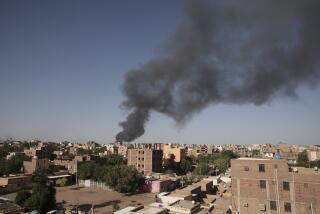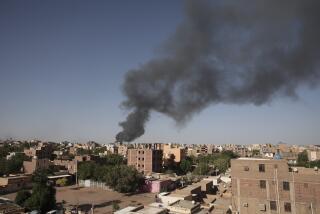Threat to Americans Increases : Gulf crisis: Baghdad orders U.S., British citizens to assemble in two hotels in occupied Kuwait. Washington protests, and London calls the move ‘grave and sinister.’
- Share via
WASHINGTON — Iraq’s military authorities ordered all Americans and Britons in occupied Kuwait to report to two luxury hotels Thursday, possibly setting the stage for a hostage crisis of unprecedented dimensions.
The Iraqi general who issued the order said it was intended to assure the safety of the Americans and Britons--an estimated 6,500 people--but he indicated that those who do not comply will be rounded up, a senior State Department official said.
The State Department said the action is “totally uncalled for,” and the British Foreign Office described it as “grave and sinister.” President Bush accused Iraq of “a violation of international norms,” but he carefully avoided inflammatory rhetoric.
“I don’t want to overstate it,” Bush said. “It’s more dangerous if I heighten the concerns that I’ve expressed.”
An Administration official said Bush was “trying to defuse the situation, to prevent the crisis from becoming a shouting match between himself and (Iraqi) President Saddam Hussein. He doesn’t want to let Iraq divert attention from the real issue, as it’s clearly now trying to do.”
Iraq’s intentions are not clear, although State Department spokesman Richard Boucher scoffed at Baghdad’s contention that the move was intended to protect the estimated 2,500 Americans and 4,000 Britons.
“Most Americans would be better off in their homes,” Boucher said.
Boucher said the U.S. Embassy informed Americans of the order but did not urge them to comply. The Iraqi general demanded that all Americans check into the Kuwait International Hotel near the embassy within two hours. But more than 12 hours later, very few Americans had obeyed, a State Department official said.
In London, William Waldegrave, a minister in the Foreign Office, said the British government fears that the order is a first step toward turning the foreign community in Kuwait into a human shield in the event of a war with the United States.
“I fear, but have no proof of this, that it’s in preparation for moving these people somewhere else,” Waldegrave said. “I would like to express the anger of the British people if any such step is taken.”
The order applies only to Americans and Britons in Kuwait. There was no similar order issued to the 530 Americans in Iraq.
Thirty-eight Americans evacuated from Kuwait have been held under armed guard in the Oberoi Rashid Hotel in Baghdad since shortly after Iraq’s Aug. 2 invasion. But other Americans are free to move about that city. Americans in both Iraq and Kuwait have been prohibited from leaving the country, although a few have slipped away.
Non-government terrorism experts speculated that Iraq intends either to intern the Americans and Britons for the duration of the Persian Gulf crisis or to use them as bargaining chips in an effort to force changes in U.S. or British policy. Regardless of Iraq’s intentions, these experts agreed, it will be impossible to rescue the detainees.
So far the Americans are not hostages, strictly speaking, because Iraq has not demanded anything in exchange for their freedom. But if Hussein decides to use the detainees to put pressure on the Administration, the implications would be grave. If all 2,500 were held, they would constitute by far the largest number of American hostages ever assembled, dwarfing the 52 held for more than a year at the U.S. Embassy in Tehran beginning in 1979.
Terrorism experts believe that Bush’s best choice among very unattractive alternatives is to warn Iraq that it would mean war if any of the Americans are harmed. The only other choices these experts see would be to yield to Iraqi demands or to allow Iraq to mistreat American citizens without retaliation.
“We should tell Saddam Hussein, ‘We can’t get them out, but you can’t hurt them without risking a military response that will lead to the end of Iraq,’ ” said terrorism expert Brian Jenkins of the Los Angeles consulting firm Kroll Associates.
After issuing such a warning, Jenkins said, the Administration should say as little as possible about the detainees.
“When the President ordered troops to the Middle East, he did so with the likelihood that there could be combat and there could be casualties,” Jenkins said. “Having crossed that line already, then decisions about how far things can go before one reacts militarily become operational decisions.
“In a hostage situation, you are trying to save lives. In a military situation, you have already accepted the possibility of casualties.”
Paul Bremer, a former counterterrorism chief at the State Department, said that Bush must not “allow himself to be cornered” by concern over the Americans held in Kuwait or Iraq.
“He has to consider the lives of the Americans that are caught there,” said Bremer, now an official of former Secretary of State Henry A. Kissinger’s consulting firm. “But he has other factors to consider, too. He has committed tens of thousands of American troops, and their lives are on the line, too.”
Boucher said that U.S. Ambassador W. Nathaniel Howell was summoned by Iraqi military authorities and told to assemble the Americans.
“Our ambassador responded immediately that this order was not only a practical impossibility, but he also asked for an explanation and reminded the Iraqi authorities of their responsibility for the safety of Americans,” Boucher said. “He made clear that he could inform Americans of the request, but that he had no power to order them to move.”
Boucher said the U.S. government instructed its embassy in Baghdad to file an immediate protest with the Iraqi government.
The U.S. Embassy in Kuwait is still operating, although the Iraqi government has said it wants all embassies there closed since it contends that the nation no longer exists as an entity.
The British Embassy in Kuwait city, the capital, also was informed that British citizens should be located in one place in Kuwait so they could be better protected, Waldegrave told reporters in London.
“The Iraqis have stated that if the British do not move voluntarily, they will face unspecified difficulties,” added Michael Weston, the British ambassador in Kuwait.
Waldegrave challenged Iraq’s stated motive of protection, saying: “It is clear to me that that cannot be.”
He added: “I hope these reports and the storm of protest that will break ‘round the head of Iraq if she pursues any policy of interning people will make her draw back, even at this late stage, if that is what she contemplates.”
Summing up conditions in Iraq and Kuwait, Boucher said: “The situation in Kuwait is obviously tense, but American citizens are generally bearing up well. . . . Services such as water and electricity are still available. Food is generally available. But there are reports of scarcities in some areas. . . . In Iraq, food shortages in some areas are evident, but Americans are not in distress.”
U.S. officials also said Thursday that there are no plans being considered to retaliate by detaining Iraqis in the United States. There are 1,403 Iraqi students in the United States.
From January to August, another 2,600 Iraqis entered on a variety of visas, immigration officials said, adding that it is impossible to know how many remain, since the United States does not require exit visas. Many thousands more Iraqis are permanent U.S. residents still holding Iraqi passports.
Times staff writer Mark Fineman, in London, contributed to this story.
FOREIGNERS IN KUWAIT AND IRAQ
American and British citizens living in Kuwait were instructed Thursday to assemble at two hotels in the emirate. Here are estimates* from diplomatic and media sources of the total number of foreigners in Kuwait and Iraq:
Country In Kuwait In Iraq Total Britain 4,000 ** Unknown Bulgaria none 5,000 5,000 Egypt 150,000 700,000 850,000 France ** ** 400 Greece ** ** 400 Ireland ** ** 350 Italy ** ** 500 Japan ** ** 450 Palestinians 300,000 none 300,000 Poland none 5,000 5,000 South Asia (includes 400,000 none 400,000 Indians, Pakistanis, Sri Lankans, Bangladeshis) South Korea 600 600 1,200 Soviet Union none 5,000 5,000 Spain ** ** 200 Sweden ** ** 160 Turkey none 60,000 60,000 United States 2,500 530 3,030 West Germany ** ** 900 Yugoslavia ** ** 12,000
* Estimates as of Thursday. ** Exact country breakdown not known. More on Gulf Crisis
* ARAB UNITY--As slogans of Arab unity rise anew in the Mideast, anti-Western slogans will grow louder, too. A6
* GERMAN ROLE--West Germany sent ships to the Mideast, leaving behind them a debate about a united Germany’s military role. A7
* CHEMICAL WEAPONS--For all the fear Iraq generates with its threats, the U.S. has a far larger supply of chemical weapons. A7
* ABC COUP--By sending “Nightline” to Baghdad, ABC staged a coup of its own, writes columnist Howard Rosenberg. F1
More to Read
Sign up for Essential California
The most important California stories and recommendations in your inbox every morning.
You may occasionally receive promotional content from the Los Angeles Times.













